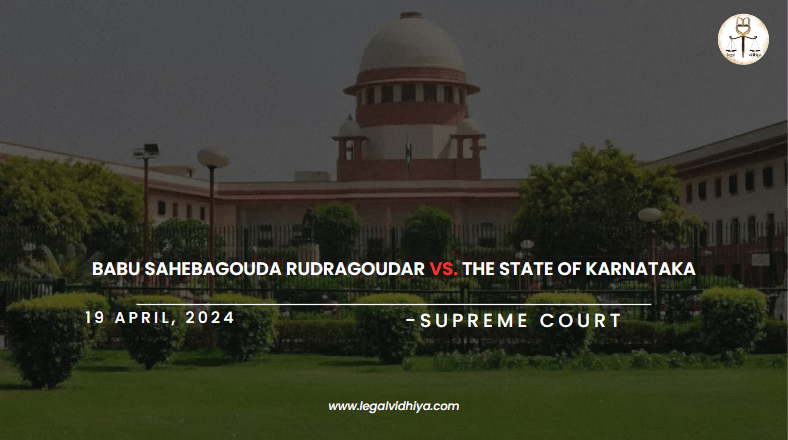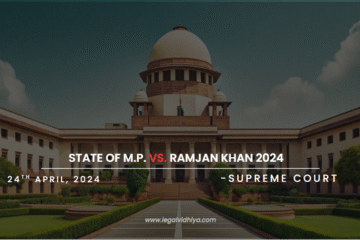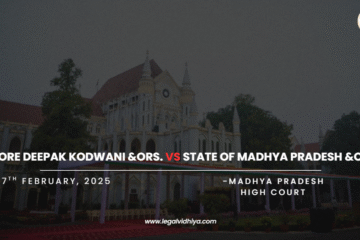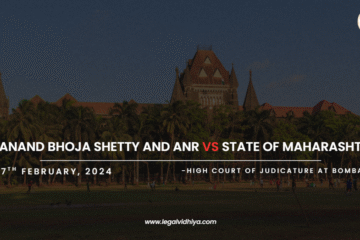
| CITATION | 2024 INSC 320 | |
| DATE OF JUDGMENT | 19 April, 2024 | |
| COURT | SUPREME COURT OF INDIA | |
| APPELLANT | BABU SAHEBAGOUDA RUDRAGOUDAR AND OTHERS | |
| RESPONDENT | STATE OF KARNATAKA | |
| BENCH | JUSTICE B.R. GAVAI | |
INTRODUCTION
The case of Babu Sahebagouda Rudragoudar vs. The State of Karnataka, decided by the Supreme Court of India on April 19, 2024, revolves around a murder trial. The appellants, Babu Sahebagouda Rudragoudar (A-1), Alagond Sahebagouda Rudragoudar (A-2), and Mudakappa @ Gadegappa Rudragoudar (A-3), along with three others, were initially tried and acquitted by the Fast Track Court I, Bijapur, for offenses punishable under Sections 143, 147, 148, 506(2), and Section 302 read with Section 149 of the Indian Penal Code, 1860 (IPC).
The State of Karnataka challenged the acquittal before the High Court of Karnataka, which allowed the appeal, reversed the acquittal of A-1, A-2, and A-3, convicted them under Section 302 read with Section 34 IPC, and sentenced them to life imprisonment. The present appeal before the Supreme Court was filed by the accused appellants, challenging the High Court’s judgment overturning their acquittal.
FACTS OF THE CASE
- The prosecution alleged that on September 19, 2001, the deceased Malagouda, son of the complainant Chanagouda (PW-1), along with laborers Revappa (PW-2), Siddappa (PW-3), Hiragappa (PW-4), and Suresh (PW-5), went to erect a bund in their land. Around noon, Chanagouda (PW-1) packed lunch for them and joined them in the field.
- Around 4:00 PM, the appellants (A-1, A-2, A-3, and A-4) allegedly confronted the group, exhorted that they would take revenge for the murder of Sangound (son of A-4), and assaulted Malagouda with sharp weapons, resulting in his death. Chanagouda (PW-1) claimed to have witnessed the incident and hid in the bushes to avoid being harmed.
- After sunset, Chanagouda (PW-1) returned to the village, informed his family members, and later filed a complaint (Exhibit P-1) at the police station around 4:00 AM on September 20, 2001, leading to the registration of FIR.
ISSUES RAISED
- Whether the High Court erred in reversing the acquittal of the accused appellants recorded by the trial court?
- Whether the prosecution successfully established the charges against the accused beyond reasonable doubt?
CONTENTIONS OF APPELLANT
1. The High Court erred in reversing the well-reasoned judgment of acquittal recorded by the trial court without finding any perversity or misreading of evidence.
2. The prosecution witnesses, including the complainant (PW-1), provided contradictory and unreliable evidence, casting doubt on their credibility.
3. The FIR was a post-investigation document with no evidentiary value under Section 162 of the Code of Criminal Procedure (CrPC).
4. The Medical Jurist’s opinion contradicted the prosecution’s theory regarding the time of death.
5. The recoveries of weapons were not proven in accordance with the law, and their evidentiary value was questionable.
CONTENTIONS OF RESPONDENT
1. The High Court thoroughly checked the evidence and correctly concluded that the prosecution witnesses were convincing and did not suffer from significant contradictions.
2. The FIR was promptly lodged, and there was no delay casting doubt on the prosecution’s story.
3. The alleged contradictions and discrepancies highlighted by the trial court were trivial and insignificant.
4. The recoveries of weapons were incriminating evidence, justifying the reversal of the acquittal by the High Court.
JUDGMENT
The Supreme Court allowed the appeal and set aside the High Court’s judgment, reinstating the acquittal of the accused appellants. The key findings and observations of the Supreme Court were:
1. The High Court erred in reversing the well-reasoned judgment of acquittal recorded by the trial court without finding any perversity or illegality.
2. The complainant’s (PW-1) testimony suffered from inherent infirmities, contradictions, and loopholes, rendering him an unreliable witness.
3. The FIR was a post-investigation document, as evident from the contradictions regarding its registration and the non-production of the Daily Diary maintained at the police station.
4. The Medical Jurist’s opinion contradicted the prosecution’s theory regarding the time of death, casting further doubt on the case.
5. The recoveries of weapons were not proven in accordance with the law, and their evidentiary value was questionable.
6. The prosecution’s case came under the shadow of doubt due to the unreliable eyewitness evidence and lack of corroboration.
ANALYSIS
The Supreme Court’s judgment in the case of Babu Sahebagouda Rudragoudar vs. The State of Karnataka highlights the significance of adhering to well-established principles governing the consideration of an appeal against acquittal. The Court reiterated that an appellate court should be cautious in interfering with an acquittal recorded by the trial court and should only do so if the findings are patently illegal, perverse, or if the only possible view based on the evidence points towards the guilt of the accused.
The Court meticulously analyzed the evidence and found numerous infirmities and contradictions in the prosecution’s case, including the unreliable testimony of the complainant (PW-1), the questionable evidentiary value of the FIR and the lack of proper proof regarding the alleged recoveries of weapons. The Court also noted the discrepancy between the Medical Jurist’s opinion and the prosecution’s theory regarding the time of death.
The Court’s emphasis on the principles governing appeals against acquittal underscores the importance of preserving the presumption of innocence and the high standard of proof required in criminal cases. The appellate court’s role is not to reappreciate the evidence as a first court but to assess whether the trial court’s findings were justified based on the evidence on record.
The Court’s decision to reinstate the acquittal of the accused appellants highlights the importance of scrutinizing the prosecution’s case thoroughly and ensuring that the standard of proof beyond reasonable doubt is met. The judgment serves as a reminder that mere inconsistencies or discrepancies in witness testimony do not necessarily warrant a reversal of acquittal if alternative reasonable views are possible based on the evidences of the cases
CONCLUSION
The Supreme Court’s judgment in Babu Sahebagouda Rudragoudar vs. The State of Karnataka upholds the principles of fair trial and the presumption of innocence. The Court’s rigorous analysis of the evidence and its adherence to the established principles governing appeals against acquittal demonstrate the highest standards of judicial scrutiny.
The judgment reinforces the notion that an acquittal should not be easily disturbed unless the findings of the trial court are perverse, illegal, or the only possible view based on the evidence points towards guilt. The Court’s decision to reinstate the acquittal of the accused appellants underscores the importance of ensuring that the prosecution’s case meets the requisite standard of proof beyond reasonable doubt.
This case serves as a valuable precedent and reaffirms the judiciary’s commitment to upholding the principles of justice and fair trial, even in the face of serious allegations. The judgment emphasizes the need for appellate courts to exercise utmost caution and adhere to established principles when considering appeals against acquittal, thereby ensuring that the rights of the accused are safeguarded, and the rule of law prevails.
REFERENCE:
SCC Online® | The Surest Way To Legal Research
Indian Kanoon – Search engine for Indian Law
This paper is written by Shivam Kumar Sahu as an intern in Legal Vidhya.
Disclaimer: The materials provided herein are intended solely for informational purposes. Accessing or using the site or the materials does not establish an attorney-client relationship. The information presented on this site is not to be construed as legal or professional advice, and it should not be relied upon for such purposes or used as a substitute for advice from a licensed attorney in your state. Additionally, the viewpoint presented by the author is of a personal nature.




0 Comments